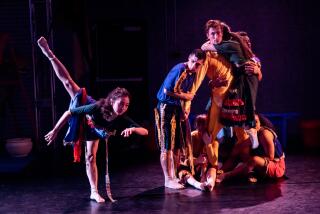DANCE REVIEW : Contraband Trio Explores Male Bonding in ‘Mandala’
- Share via
In “Mandala,” three men from the Bay Area performance collective Contraband explore male identity through text and dance, with special emphasis on the influence of their fathers.
Presented through Sunday at Highways in Santa Monica, the hourlong piece shows Keith Hennessy, Jess Curtis and Jules Beckman swooping through high-velocity movement challenges derived from contact improvisation, periodically pausing to drum or sing or explain how their fathers failed them.
The stories and dances exude maximum theatrical flair but a fatal clash develops between subject and method. Male sensitivity may be the focus of the project, but winning by intimidation is its game, with enough pumped-up, in-your-face athleticism to make you think you’re watching “Rambo: The Ballet.”
The bad-dad monologues also play as exercises in manipulation, with Hennessy flinging out details about his sexual needs as if daring you to flinch. In this intimate studio, nobody talks man to man, no one lets down his defenses and soon the autobiographical confessions seem just another form of display.
At one point, the men dance until they collapse, then strip naked and place a bowl of water on the floor between them. Each bends to drink while the others stroke him affectionately. And for a long moment, you expect the piece to make good on its intentions.
After all, these guys have just spent most of an hour working through the nonsense that passes for male bonding. They’re exhausted, vulnerable, ready for some sort of genuine connection.
But it never happens. The moment is literally a breather, a chance for Contraband to recharge for the final unison assault: a nude drum-dance. With feet kicked, arms hurled high and some sound like “Yo!” uttered rhythmically, “Mandala” ends in a cadenza of militaristic machismo.
During the curtain calls Thursday, the guys announced a series of weekend workshops--but right now they should be taking workshops, not giving them. From Rudy Perez, for instance, on getting in touch with their feelings as performers. Or from Stephen Petronio, on expressing male intimacy in dance. Or Bill T. Jones, on partnering rapport, keeping a text emotionally grounded and confronting a parental relationship.
In a decade when even Mikhail Baryshnikov dances a lyric male duet, “Mandala” represents a curiously guarded, preliminary foray into male consciousness--one that never dares challenge traditional male roles in dance. Deep down, it’s only three studs showing off.
More to Read
The biggest entertainment stories
Get our big stories about Hollywood, film, television, music, arts, culture and more right in your inbox as soon as they publish.
You may occasionally receive promotional content from the Los Angeles Times.










